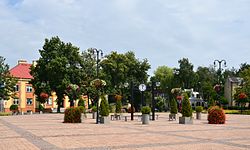Rypin
Place in Kuyavian-Pomeranian Voivodeship, Poland From Wikipedia, the free encyclopedia
Place in Kuyavian-Pomeranian Voivodeship, Poland From Wikipedia, the free encyclopedia
Seamless Wikipedia browsing. On steroids.
Every time you click a link to Wikipedia, Wiktionary or Wikiquote in your browser's search results, it will show the modern Wikiwand interface.
Wikiwand extension is a five stars, simple, with minimum permission required to keep your browsing private, safe and transparent.
Rypin [ˈrɨpʲin] is a town in north-central Poland, in Kuyavian-Pomeranian Voivodeship, about 50 km east of Toruń. It is the capital of Rypin County. Population is 16,528 (2010).[1]
Rypin | |
|---|---|
 Nowy Rynek (New Market Square) | |
| Coordinates: 53°4′N 19°27′E | |
| Country | |
| Voivodeship | Kuyavian-Pomeranian |
| County | Rypin |
| Gmina | Rypin (urban gmina) |
| Town rights | 14th century |
| Government | |
| • Mayor | Pawel Grzybowski (PiS) |
| Area | |
| • Total | 10.96 km2 (4.23 sq mi) |
| Population (2010)[1] | |
| • Total | 16,528 |
| • Density | 1,500/km2 (3,900/sq mi) |
| Time zone | UTC+1 (CET) |
| • Summer (DST) | UTC+2 (CEST) |
| Postal code | 87-500 |
| Car plates | CRY |
| Voivodeship roads | |
| Website | http://www.rypin.eu/ |

Rypin was founded in the Middle Ages, and was part of Poland since the establishment of the state in the 10th century. From the 11th century it was the seat of a local castellany, and from the 14th century it was a county seat. It was granted town rights in the early 14th century, and afterwards it was a royal town of the Polish Crown, administratively located in the Dobrzyń Land in the Inowrocław Voivodeship in the Greater Poland Province. In the early 14th century, local dukes of the Polish Piast dynasty founded a hospital in Rypin to commemorate their deceased father Duke Siemowit of Dobrzyń.[2] In 1352, the hospital was granted various privileges by Duke Władysław the Hunchback.[2] Rypin was located on a trade route connecting Toruń with Brześć.[3] The 1st Polish National Cavalry Brigade was stationed in the town.[4]
Following the Second Partition of Poland (1793), the town was annexed by Kingdom of Prussia. In 1807, it passed to the short-lived Polish Duchy of Warsaw, and after its dissolution in 1815, it became part of the Russian Partition of Poland. During the January Uprising, Polish insurgents captured the town on February 4, 1863.[5] Following World War I, Poland regained independence and control of Rypin. During the Polish–Soviet War, Rypin was occupied by Russians on 14 August 1920, and liberated by Poles on 20 August 1920.

During the German invasion of Poland, which started World War II in September 1939, the town was invaded and then occupied by Germany until 1945. The Polish population was subjected to an extensive genocidal campaign. In September 1939, a German police prison was established in the town, and in October 1939, the German police and Selbstschutz carried out mass arrests of local Poles.[6] Hundreds of arrested Poles were interrogated and then murdered on the spot and buried in nearby Skrwilno, during the German-perpetrated Intelligenzaktion.[7] Among the victims were 96 Polish teachers and school principals from the town and county.[7] Many local Poles were also murdered during large massacres carried out by the Germans in Skrwilno in October and November 1939.[8] In 1944 the occupiers burned the victims' bodies in attempt to cover up the crime committed in Skrwilno.[8] Poles were also murdered in other places in Rypin, and around 200 Poles from the town and county were massacred in the nearby village of Rusinowo.[9] In 1939–1942, the Germans also expelled over 5,100 Poles from the town.[10] Most of the expelled Poles were imprisoned in a transit camp in Toruń and then deported to the General Government in the more-eastern part of German-occupied Poland, as their houses were handed over to German colonists as part of the Lebensraum policy.[11] According to a Gestapo document from 1942, many remaining Poles fled from Rypin trying to avoid signing to the Deutsche Volksliste, however, many Poles eventually signed under the threat of deportation to German concentration camps.[12] A transit camp for Poles expelled from nearby villages in 1942 was operated in the town.[13] Rypin was liberated by the Soviet Army at the end of 1944.
Near to Rypin is Lake Urszulewo.